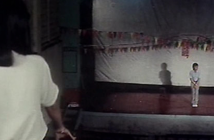
A Summer at Grandpa’s (1984)
Cast: Chi-Kuang Wang, Shu-Chen Li, Hsiu-Ling Lin
Directors: Hsiao-Hsien Hou
Country: Taiwan
Genre: Drama
Editor’s Notes: The following review is part of our coverage for TIFF’s Good Men, Good Women: The Films of Hou Hsiao-hsien. For more information on upcoming TIFF film series visit http://tiff.net and follow TIFF on Twitter at @TIFF_NET.
Beginning at a somber, unadorned graduation ceremony as a young class exits the school to embark on a summer vacation before their next educational adventure, the class speaker’s voice touches plainly on the persistent contradicting emotions that come with such a transition: the pain and sadness of saying goodbye, with the understanding that they’ll always have the blissful memories to comfort them going forward. The speaker mentions her own confusion when seeing the tears of graduates before her, wondering why it is such a raw occasion, and that it took the experience itself to truly grasp and understand why growing up can feel so disorienting.
Focusing on the complexities of the world as one leaves adolescence, the film sports a pointedly simple screenplay by Chu Tien-wen as well as a slow, realistic cinematic pace set by director Hou Hsaio-Hsien.
As forthright and plain as the speaker addresses their collective emotional perspective, A Summer at Grandpa’s spends the rest of the runtime hammering this point home with much more subtlety. Focusing on the complexities of the world as one leaves adolescence, the film sports a pointedly simple screenplay by Chu Tien-wen as well as a slow, realistic cinematic pace set by director Hou Hsaio-Hsien. At the same time as Hou slowly introduces the increasingly intricate system of actions and consequences which become more severe as one ages, the majority of the film is framed through the eyes of Tung-Tung (Chi-Kuang Wang) and Ting-Ting (Shu-Chen Li), siblings who are sent to the countryside residence of their physician grandfather for the summer. Unsurprisingly, the filter of adolescence can only go so far to shield young eyes from the absurdity of the world at large, a point repeatedly confirmed for young Tung-Tung and his group of newfound friends.
Situated at the dawning of Hou’s many contributions to Taiwanese New Wave cinema, Grandpa’s bears many of the marks of the movement …
Situated at the dawning of Hou’s many contributions to Taiwanese New Wave cinema, Grandpa’s bears many of the marks of the movement: in cinematic time, the entirety of the summer passes by, and yet the pace of the story is more markedly stagnant without an undercurrent of a “highlight reel.” This too applies to the formal aspects of the film, with the camerawork by Chen Kunho (whose directorial effort from 1983 Growing Up also played a seminal role in the movement) capturing the behavior and observation of the real world with a conglomeration of long takes and wide shots which do as much to capture the luscious landscape as the methodical movements of the characters. To contrast this, every quick cut by the camera or sudden movement by a figure on-screen is fraught with intensity, whether it’s a rescue from a possible train accident or the tension of a physical altercation between generations. But don’t be fooled-there is as much meaning in the extended sequences of passive contemplation as there are in these moments of energy.
Canonical context aside, A Summer at Grandpa’s is strongest when it puts the focus on Tung-Tung, and his gradual transformation into a more informed teenager. Several times throughout the film, family members such as his uncle or his grandfather pull the boy aside for a talk, and they attempt to bestow upon him knowledge essential to understanding the complexities of people’s actions. These talks are not misdirected simply because the elder is using the conversation to vent their own chagrin about the events taking place (although this is a rather entertaining irony), but rather Tung-Tung simply learns more in his role as an uninvolved observer in this urban village. When his uncle is caught in a scandal, the fallout of which involves multiple families and generations, the uncle is forced to move to a secondary residence, where eventually he gets mixed up with some felonious former classmates.
Although the adults carry out their discussions and quarrels in what they feel is a stealthy fashion, Tung-Tung is privy to many of the more scandalous and devastating incidents simply by standing in the right stretch of hallway. Similarly, the neighborhood children witness a highway robbery by the chance that they happen to be wandering down the road. As much as the family elders attempt to adjudicate the best methods to explain the more bitter ends of life to the younger generation, life finds a way of educating them first. Tung-Tung doesn’t fully understand his grandfather’s lessons about Han-Tzu (a local woman who is mentally disabled), but an adjacent message is loud and clear when he witnesses his uncle being questioned at the local police precinct.
Connecting the message of the film, that life will slowly but relentlessly find a way to prepare children for adulthood, with the measured, deliberate form which epitomizes the Taiwanese New Wave, is in itself the ultimate triumph of Hou’s first entry into his coming-of-age trilogy (which is completed by The Time to Live and the Time to Die and Dust in the Wind). No doubt much of the substance originated from personal experience in some form, but the ability to effortlessly illustrate the grand ironies involved with outgrowing childhood is a gift few directors are able to adequately brandish.
No doubt much of the substance originated from personal experience in some form, but the ability to effortlessly illustrate the grand ironies involved with outgrowing childhood is a gift few directors are able to adequately brandish.



